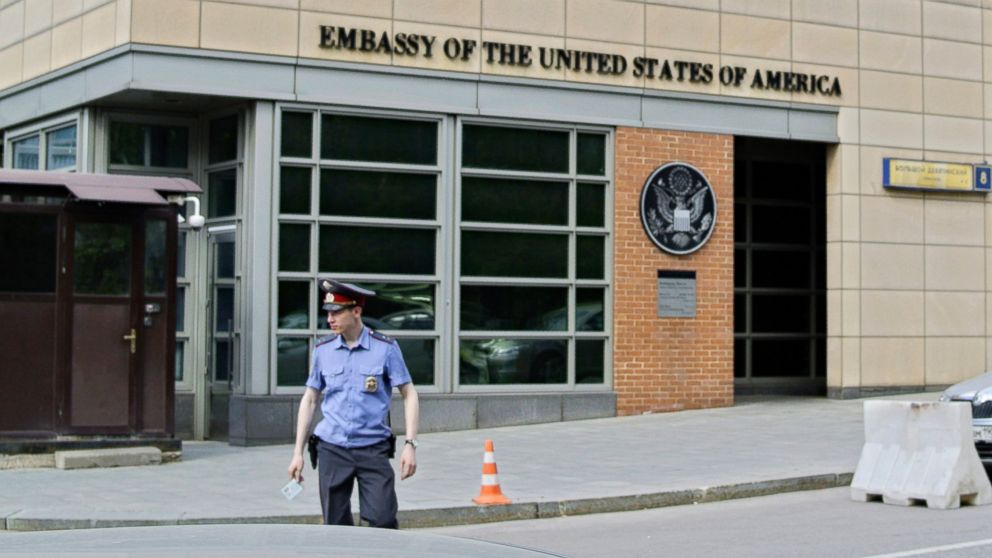Russia Expels Two U.S. Diplomats in Row after American Tackled Outside Embassy
The U.S. earlier expelled two Russians after its diplomat was tackled in Moscow.

— -- MOSCOW -- Russia has expelled two American diplomats after the United States kicked out two Russian embassy staff to protest an incident in which a Russian police guard apparently tackled a U.S. diplomat outside its embassy in Moscow.
Sergey Ryabkov, a Russian deputy foreign minister, announced that the American diplomat involved in that incident had been declared “persona non grata” along with another person he called a “CIA operative”. In a statement posted on the ministry's website, Ryabkov said the two were expelled in June after the U.S. threw out the two Russian diplomats.
The scuffle that prompted the expulsions occurred June 6, when a U.S. diplomat trying to enter the embassy was tackled by a Russian police guard. A CCTV video of the struggle was aired by Russian television channel NTV this week.
In the video, a man is seen exiting a taxi outside the entrance of the embassy and swiftly making for the door. Before he can reach it, a guard springs from his security cabin and slams the diplomat into the wall, with both men falling to the ground. With the guard on top of him, the diplomat eventually manages to drag himself on his back across the threshold of the embassy, which as U.S. territory is off-limits to the guard.
U.S. officials confirmed that the video was authentic and said they were in possession of their own video from the embassy's cameras.
The U.S. State Department said the diplomat had suffered a broken shoulder in the incident, and on Friday announced it had already expelled two Russian diplomats in June in response for what it said was an unprovoked assault.
Russia’s foreign ministry though has accused the diplomat of being a U.S. spy and claimed he had attacked the guard, punching him in the face when the guard tried to stop him for not showing identification.
Today, Ryabkov called the diplomat a “night-time hooligan” and said he was returning from an intelligence operation.
John Kirby, a State Department spokesman, called the Russian version of events “simply untrue” and said it was part of a pattern of intensifying harassment of American diplomats in the past two years.
The State Department this month said Secretary of State John Kerry had formally complained to the Russian government about the harassment in Moscow and of U.S. embassy staff in other countries.
Some U.S. staff with the embassy in Moscow said they also believed the diplomat had likely been a CIA agent operating under diplomatic cover.
Hassling foreign diplomatic staff has long been standard practice for Russian security services, with embassy workers often expecting to be followed or even to have their furniture moved around by their agent-minders, though a physical assault is highly exceptional. In a story told at the Irish embassy, one diplomat found himself counting his favorite biscuits after he realized they appeared to be going missing. After keeping a count, he realized his minder also had a taste for them, eating them when he broke into his house.
But recently the harassment of American diplomats appears to have gotten worse, coinciding with a sharp downturn in relations between Moscow and Washington after Russia seized Crimea from Ukraine in early 2014.
U.S. embassy staff in Moscow said that in the past two months they have been subjected to increased traffic stops by police, sometimes deliberately held so that they would miss their scheduled flights.
Kirby said the pressure upon embassy staff was not always authorized from the top. But he called on Russian authorities “to rein in those elements seeking to impede our diplomatic and consular activities in Russia and our bilateral relationship.”




